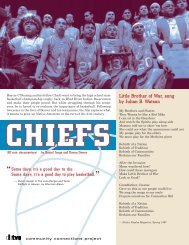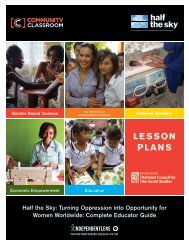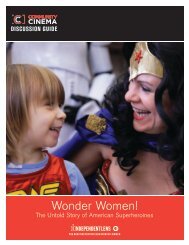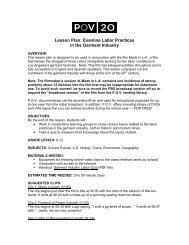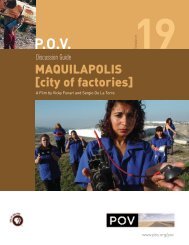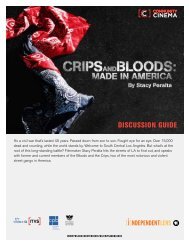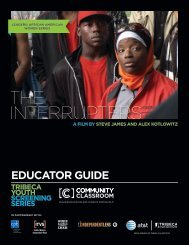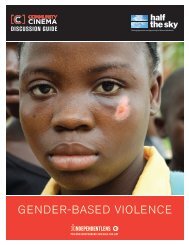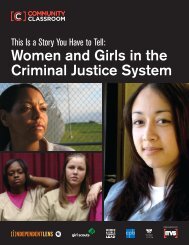economic empowerment - PBS
economic empowerment - PBS
economic empowerment - PBS
- No tags were found...
Create successful ePaper yourself
Turn your PDF publications into a flip-book with our unique Google optimized e-Paper software.
The FilmEpisode TwoEpisode Two continues our journey to the hot spots of gender oppression around the world and highlightsthe courageous work of some of the extraordinary women and men who are taking a stand in the faceof incredible odds. This episode focuses our attention on the role of women in their families and theircommunities — examining the fundamental obstacles that hinder their potential, and charting the ripple effectthat results when that potential is harnessed.Veteran journalist and Half the Sky: TurningOppression into Opportunity for WomenWorldwide co-author Nicholas Kristof isonce again accompanied by a three celebratedAmerican actresses who offer freshand personal perspective on the issues ineach country. Kristof travels to Somalilandwith Diana Lane to examine maternalmortality and female genital mutilation,to India with America Ferrera to exploreintergenerational prostitution, and withOlivia Wilde to Kenya, where the transformativepower of <strong>economic</strong> <strong>empowerment</strong>is changing women’s lives and is layingthe groundwork for the next generation. Inthe process, the film considers the centralrole of women in the health and stability oftheir families and communities and establishestheir critical role in the global effortsto eradicate poverty and achieve peace.Featuring on-camera commentary fromSheryl WuDunn and some of the world’smost respected and outspoken advocatesfor gender equality — including MelanneVerveer, Zainab Salbi, and DesmondTutu − Episode Two underscores the fundamentalobstacles to women’s progressand prosperity and celebrates women’sboundless capacity to better our world.Maternal MortalityThe episode begins in Somaliland — anunrecognized country, populated mainlyby nomads, where the average womantoday has a 1-in-12 chance of dying inchildbirth. Joined by actress Diane Lane,Kristof reconnects with Edna Adan, founderof the Edna Adan Maternity Hospitalin Hargeisa. A spry 70-something womanoften and rightly described as a “force ofnature,” Adam is almost single-handedlyrevolutionizing the experience of childbirthin her country — providing medical care towomen who would otherwise have none,training midwives, and fighting tirelesslyagainst female genital mutilation — a traditionalpractice still common in much ofAfrica (and elsewhere), which severelycompromises a woman’s ability to delivera child. In Somaliland, the challengeswomen face in the developing world arestarkly apparent: Poverty and traditionconspire to undermine a woman’s health,directly threatening her life, and having alasting impact on her children’s survivaland ability to thrive.Intergenerational ProstitutionAs WuDunn and our cast of gender equalityadvocates argues, tradition is, in manyways, the greater evil. In too many placesin the world, tradition still is used to marginalizewomen, to keep them down andin their place. This vicious cycle repeatsitself generation after generation, damagingand ending lives and undermining theability of thousands of women improvetheir quality of life and live their fullpotential. The key — as Kristof and actressAmerica Ferrera discover in India — isintervention by someone from the inside:someone like Urmi Basu. A social workerand an educated, middle-class Bengali,Basu has dedicated her life to stoppingthe cycle of intergenerational prostitutionin India, where 90 percent of girls bornto sex workers follow in their mothers’footsteps. What she is up against is neatlyillustrated by one of the young girls inher care, Monisha, who is on the brink ofbeing wrenched out of school and likelysold to a brothel by her own family — afamily that belongs to a sub-caste of sexworkers. What keeps Basu going is girlslike Sushmita — and more to the point,women like Sushmita’s mother, Shoma,who has lived the utter brutality and desolationof prostitution every day of her lifeand desperately wants a different fate forher daughter. Shoma’s hope for her childis the seed of real and lasting change.Economic EmpowermentWhen women have equal control overtheir finances and the financial decisionmakingon the personal, community,and national levels, everyone benefits.WuDunn and the many contributors wholent their voices and considerable expertiseto Half the Sky: Turning Oppressioninto Opportunity for Women Worldwideall stress that putting money in the handsof a poor woman changes everything.During their visit to Kenya, Kristof andOlivia Wilde witness the impact of the<strong>economic</strong> <strong>empowerment</strong> of women firsthand.In this episode’s final segment,they explore the impact and challenges ofmicrofinance and the ways is transformingthe lives of women and those aroundthem. We begin with Jane Ngoiri, a formersex worker-turned-dressmaker who is nowable to send her four children to school,where they are each at the top of theirclass, and end with Rebecca Lolosoli, aSamburu woman who built a safe havenfor women on the slender thread of a jewelry-makingbusiness. Kristof and Wildesee for themselves the dramatic andtangible transformation that can be set inmotion by a woman with a little money ofher own and a system of support to helpher make the best use of her financial andpersonal resources. Replicate the experimentseveral million times, and the worldwill be an entirely different place.The episode — and the film — ends withan urgent call to action, an invitation tothe viewer to take up the central moralchallenge of our time, and to join a movementthat will tap the immense potentialof women to create a more peaceful andmore prosperous world for us all.Discussion guide // <strong>economic</strong> <strong>empowerment</strong>6




